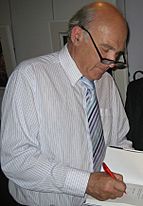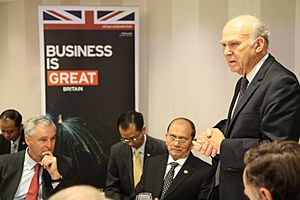Vince Cable facts for kids
Quick facts for kids
Sir Vince Cable
|
|
|---|---|
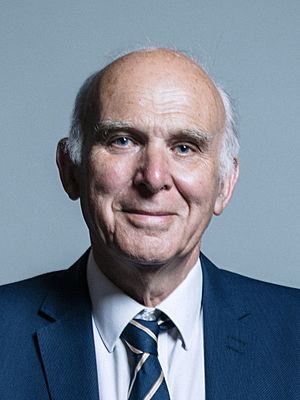
Official portrait, 2017
|
|
| Leader of the Liberal Democrats | |
| In office 20 July 2017 – 22 July 2019 |
|
| Deputy | Jo Swinson |
| President | The Baroness Brinton |
| Preceded by | Tim Farron |
| Succeeded by | Jo Swinson |
| Acting 15 October 2007 – 18 December 2007 |
|
| President | Simon Hughes |
| Preceded by | Menzies Campbell |
| Succeeded by | Nick Clegg |
| Secretary of State for Business, Innovation and Skills President of the Board of Trade |
|
| In office 12 May 2010 – 12 May 2015 |
|
| Prime Minister | David Cameron |
| Preceded by | The Lord Mandelson |
| Succeeded by | Sajid Javid |
| Deputy leader of the Liberal Democrats | |
| In office 2 March 2006 – 26 May 2010 |
|
| Leader | Menzies Campbell Nick Clegg |
| Preceded by | Menzies Campbell |
| Succeeded by | Simon Hughes |
| Member of Parliament for Twickenham |
|
| In office 8 June 2017 – 6 November 2019 |
|
| Preceded by | Tania Mathias |
| Succeeded by | Munira Wilson |
| In office 1 May 1997 – 30 March 2015 |
|
| Preceded by | Toby Jessel |
| Succeeded by | Tania Mathias |
| Liberal Democrat portfolios | |
| 1999–2003 | Trade and Industry |
| 2003–2010 | HM Treasury |
| 2015 | Business, Innovation and Skills |
| 2017 | HM Treasury |
| 2019 | Health and Social Care |
| Personal details | |
| Born |
John Vincent Cable
9 May 1943 York, England |
| Political party | Liberal Democrats (1988–present) |
| Other political affiliations |
Liberal (before 1965) Labour (1966–1982) SDP (1982–1988) |
| Spouses |
|
| Children | 3 |
| Relatives | Ayrton Cable (grandson) |
| Alma mater | |
| Signature | |
| Office vacant from 12 May 2010 to 7 January 2015. Office vacant from 12 May 2010 to 7 January 2015. |
|
Sir John Vincent Cable (born 9 May 1943) is a British politician. He was the Leader of the Liberal Democrats from 2017 to 2019. He also served as a Member of Parliament (MP) for Twickenham. He held this role from 1997 to 2015 and again from 2017 to 2019.
Sir Vince Cable was a senior government minister. He was the Secretary of State for Business, Innovation and Skills from 2010 to 2015. This was during a time when the Liberal Democrats shared power with the Conservative Party.
He studied economics at Cambridge and Glasgow. Before becoming an MP, he worked as an economic adviser in Kenya and for the Commonwealth Secretariat. He also taught economics at Glasgow University. Later, he was the Chief Economist for Shell.
Cable started his political journey with the Labour Party. He became a councillor in Glasgow in the 1970s. In 1982, he joined the Social Democratic Party (SDP). This party later joined with the Liberal Party to form the Liberal Democrats.
After trying four times, Cable was elected as an MP for Twickenham in 1997. He quickly became the Liberal Democrats' spokesperson on money matters. In 2006, he was elected as the Deputy Leader. He stepped down from these roles in 2010 to become a Cabinet minister.
He lost his seat in 2015 but won it back in 2017. After this, he became the leader of the Liberal Democrats. In 2019, he led the party to a strong result in the European Parliament election. The party campaigned against Brexit. He then decided to retire from politics. He stepped down as leader in July 2019 and left Parliament in the 2019 general election.
In 2022, Sir Vince Cable became the Vice President of the European Movement.
Contents
Early Life and Education
Vince Cable was born in York, England. His family supported the Conservative Party. His father worked for Rowntree's, and his mother packed chocolates for Terry's.
He went to Nunthorpe Grammar School, where he became Head Boy. He then studied at Fitzwilliam College, Cambridge. He first studied science and then switched to Economics. In 1965, he was the President of the Cambridge Union.
After Cambridge, in 1966, Cable worked in Kenya as a Treasury Finance Officer. In 1973, he earned his PhD in Economics from the University of Glasgow. His studies focused on how countries work together economically and how industries grow.
Economics Career and Expertise
Cable taught economics at the University of Glasgow. He was also a visiting researcher at the London School of Economics. In 2016, he became an Honorary Professor of Economics at the University of Nottingham.
In the 1970s, he worked for the Foreign Office and advised the UK Government. He also advised the Commonwealth Secretary-General. He attended several important meetings with world leaders in the 1980s.
Cable wrote many books and articles about globalisation and free trade. These ideas suggest that countries benefit from trading freely with each other.
From 1990 to 1997, Cable worked for the oil company Royal Dutch Shell. He was their Chief Economist from 1995 to 1997.
Political Journey
Early Political Steps
Vince Cable was a member of the Liberal Party at university. In 1966, he joined the Labour Party. He tried to become an MP for Labour in 1970 but was not successful.
He became a Labour councillor in Glasgow in 1971. He served until 1974. In 1982, he joined the Social Democratic Party (SDP). He ran for Parliament for the SDP in 1983 and 1987.
After the SDP joined with the Liberal Party, he ran for the Twickenham seat in 1992. He came in second place.
Member of Parliament (1997–2015)
Cable became an MP for Twickenham in the 1997 general election. He won the seat from the Conservative MP Toby Jessel. He increased his majority in the elections of 2001, 2005, and 2010.
In 2004, Cable helped write The Orange Book. This book suggested policies like more private sector involvement in education and healthcare. Cable described himself as a "social democrat" and an "open markets" liberal. He wanted to combine economic freedom with social fairness.
He believed the Liberal Democrats should move towards a more free market approach. This shift was seen by some as helping the party form a coalition government with the Conservatives in 2010.
In 2005, he suggested changes to income tax. He supported exempting low-income people from tax. He also explored the idea of a flat tax.
In 2006, Cable was part of a group of MPs who expressed a lack of confidence in the Liberal Democrat leader, Charles Kennedy. Kennedy resigned, and Cable supported Menzies Campbell for the leadership.
Deputy Leader of the Liberal Democrats (2006–2010)
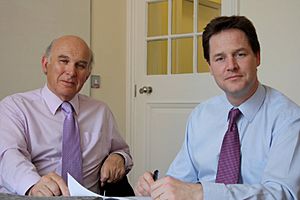
Cable was praised for warning about high levels of personal debt in Britain. He called for the nationalisation of the bank Northern Rock during its crisis.
In May 2010, Cable resigned as Deputy Leader. He wanted to focus on his new role as Business Secretary in the government.
Acting Leader (2007)
When Sir Menzies Campbell resigned as Party Leader in October 2007, Cable became the Acting Leader. He decided not to run for the leadership himself.
He was highly praised for his strong performances in Parliament. He made a famous joke about Gordon Brown, comparing him to "Stalin to Mr. Bean, creating chaos out of order."
Views on the Financial Crisis
Some people say Cable predicted the global financial crisis. In 2003, he asked then-Chancellor Gordon Brown about the risks of high personal debt and rising house prices.
In his book The Storm, Cable wrote that the crisis started in the US mortgage market. He praised US President George W. Bush for his actions to "save Western capitalism."
Cable also spoke out against large bonuses in the banking system. He called for these bonuses to be frozen.
Government Minister (2010–2015)
After the 2010 general election, Cable was a key figure in forming the coalition government. On 12 May 2010, he became Secretary of State for Business, Innovation and Skills.
In 2010, Cable supported changes to Capital Gains Tax. He said these changes would make the tax system fairer. He also pushed for banks to lend more to small businesses.
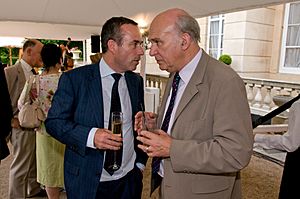
Cable led efforts to reduce government rules and paperwork for businesses. This was called the "Red Tape Challenge." He believed businesses should not be "tied up in unnecessary red tape."
In 2010, he said that bankers were more of a threat to Britain than trade unions. He supported separating retail banking from investment banking to make the system safer.
He also worked to control high executive pay. He wanted companies to publish clearer reports on pay. He also supported shareholders having a binding vote on executive pay.
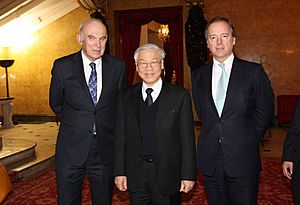
In 2011, Cable announced changes to employment laws. He suggested introducing fees for employees making claims against employers. This was to help small businesses. However, these fees were later ruled unlawful by the Supreme Court.
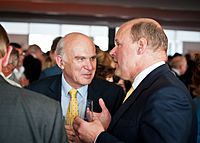
In 2012, Cable called for more deregulation in the European Union. He wanted to reduce rules and make the job market more flexible. He also supported expanding the Single Market.
He supported zero hours contracts in 2013. He said they had a place in the job market, but he admitted there had been "abuse."
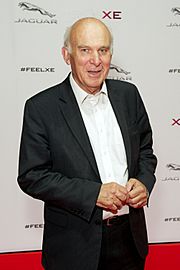
In 2014, Cable faced criticism for approving arms deals to Israel during a conflict. He later said arms exports would be suspended if a ceasefire was not kept.
In 2015, Cable refused to issue export licences for bombs to the Royal Saudi Air Force. He was concerned about how they might be used in Yemen. He later agreed after getting assurances about oversight of targets.
Comments to The Daily Telegraph (2010)
In December 2010, Cable spoke to undercover reporters. He said he was frustrated with the coalition government. He compared it to "fighting a war." He also said he had a "nuclear option" to bring the government down by resigning.
He also said he had "declared war" on Rupert Murdoch over a media takeover bid. Because of this, his responsibilities for media affairs were removed. Cable later said he regretted his comments and remained committed to the government.
Royal Mail Sale
As Business Secretary, Cable oversaw the privatisation of the Royal Mail in 2013. This meant selling shares in the company to private investors. The share price increased significantly after the sale.
The National Audit Office said the sale price was too cautious. However, Cable defended the decision. He said the sale raised £2 billion for taxpayers.
After Being a Minister
Cable lost his seat in the 2015 general election. He had been an MP for 18 years. This meant he also resigned as Secretary of State for Business, Innovation and Skills.
Return to Parliament
Cable decided to run for his old seat in the 2017 general election. He won back the Twickenham seat with a large majority.
After the election, he joined Ed Miliband and Ken Clarke to oppose a takeover bid for Sky UK.
Following Tim Farron's resignation, Cable announced he would run for leader of the Liberal Democrats.
Leader of the Liberal Democrats
On 20 July 2017, Vince Cable became the leader of the Liberal Democrats without opposition. He was the oldest leader of a major UK political party since Winston Churchill.
Key Policies as Leader
Cable's main policy goals as leader included:
- Tackling inequality.
- Improving public services.
- Opposing Brexit.
- Reforming the electoral system.
- Supporting young people.
He became more "interventionist" economically. He called for blocking some foreign takeovers of UK technology companies. He also wanted to reform UK takeover laws.
Cable suggested taxing foreign investors in the housing market more. He also called for changes to rules on empty homes.
In 2017, he announced that the Liberal Democrats would bring back the "Golden Rule" for government spending. This rule aims to ensure the government only borrows to invest, not to fund day-to-day spending.
On education, Cable did not support cutting university tuition fees. Instead, he proposed "lifelong learning accounts." These accounts would give young people money for education or training at any time in their lives. He also suggested abolishing the Ofsted inspectorate and changing school league tables to focus on student well-being.
In 2018, Cable announced that eight European liberal prime ministers had agreed to demand another referendum on Brexit. However, the ALDE group later denied this joint agreement.
He proposed creating a state land-buying agency. This agency would buy land at a lower value to help build more homes. He also suggested a sovereign wealth fund of £100 billion.
Cable called for more spending on public services and an end to austerity. He criticized the government's budget for not increasing spending enough.
Views and Beliefs
Cable sees himself as a centrist politician, similar to French President Emmanuel Macron. He believes his party should occupy the "vast middle ground" in politics.
He supports the Social Liberal Forum, a centre-left group within the Liberal Democrats.
Trade
He supported the proposed Transatlantic Trade and Investment Partnership (TTIP) trade agreement. He believed it would benefit both the US and the UK. He argued that it would not privatize the NHS.
Cable believes free trade benefits all countries. He says it leads to more choices, better products, and lower prices for consumers. He has criticized politicians who use fear about job losses from foreign trade.
Human Rights
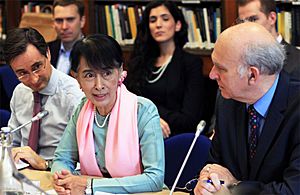
In 2018, Cable criticized the UK government for welcoming Turkish President Recep Tayyip Erdoğan. He said Erdoğan was "responsible for alarming oppression and violence."
After the murder of Saudi journalist Jamal Khashoggi, Cable called for the UK to suspend arms export licences to Saudi Arabia.
Economy and Taxation
As an economist, Cable admires Adam Smith and John Maynard Keynes. He supports more capital spending by the government. This means borrowing to invest in things like infrastructure.
He supports a 1p rise in income tax to pay for health and social care. He also supports a wealth tax to address "intergenerational inequality."
Cable has criticized the National Living Wage (the UK's minimum wage system). He argued in 2015 that smaller businesses would struggle to pay higher rates.
He believes large technology companies like Google, Amazon, and Facebook should be broken up. He also supports a digital services tax on these companies.
Coalitions and Pacts
Cable has been cautious about forming coalitions with other parties. In 2018, he said the Liberal Democrats would never form a coalition with Labour if Jeremy Corbyn was leader. He also compared a coalition with the Conservatives to "mating with a praying mantis" where "You get eaten at the end of it."
He prefers to work with other parties on specific issues rather than forming full governments.
Brexit
Cable believed that Brexit might not happen. He thought that people would turn against it once they saw the economic costs. He hoped a cross-party group would form to oppose Brexit.
He called for a single EU market for digital services like Netflix.
In June 2018, Cable spoke at the People's Vote march in London. He encouraged people to "keep fighting, keep hoping, we will win" against Brexit.
He argued that the government was preparing for riots due to a "botched Brexit." He criticized Theresa May for putting the country's interests second to the demands of extreme members of her party.
Tuition Fees
In 2017, Cable defended the £9,000 per year university tuition fees. He said it would be "dangerous and stupid" to abolish them. He argued that students who go to university should not be fully paid for by the 60% who do not.
Housing
Cable supports building on green belts to solve the housing crisis. He also proposes allowing councils to charge a much higher council tax on empty homes.
The House of Lords
In 2018, Cable wrote that he opposed the House of Lords. This is the upper house of the British Parliament. He disliked that its members are not elected. However, he appreciated its role in challenging the government over Brexit laws. Cable declined an offer to join the House of Lords in 2015.
Personal Life
Vince Cable's first wife was Olympia Rebelo. They met while working as nurses during a summer holiday. They had three children together. Olympia passed away in 2001 after battling breast cancer.
In 2004, he married Rachel Wenban Smith. Cable wears the wedding rings from both of his marriages.
He is a keen ballroom dancer. He appeared on the BBC show Strictly Come Dancing in 2010. He performed well and scored high marks from the judges.
Cable supports several charities. He is a patron of MyBigCareer, which helps young people with career guidance. He also supports the Polycystic Kidney Disease Charity (PKD) and the Changez Charity. He chairs HCT Group, a transport operator.
His eldest grandson, Ayrton Cable, is a social activist and entrepreneur.
Cable revealed in his memoir that he had a minor stroke in May 2018 while leading the Liberal Democrats.
Honours
- In 2010, he became a member of Her Majesty's Most Honourable Privy Council. This gave him the title "The Right Honourable" for life.
- In 2015, he was appointed a Knight Bachelor for his public service.
See also
 In Spanish: Vince Cable para niños
In Spanish: Vince Cable para niños
- Liberal Democrat Frontbench Team
- Opposition to Brexit
 | John T. Biggers |
 | Thomas Blackshear |
 | Mark Bradford |
 | Beverly Buchanan |


